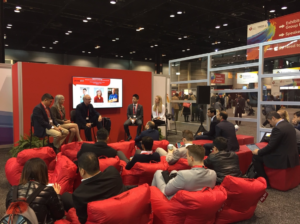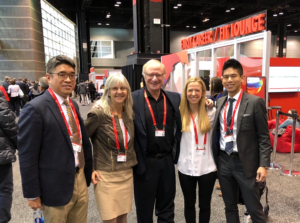Why Attend #AHA19?
After returning home from the #AHA18 Scientific Sessions a few weeks ago, I was eager to tell my colleagues back in Los Angeles about my experience.
“What did you like about it?” they would ask. While my replies would consistently begin with, “Well, despite the freezing cold…” I found my answers that followed were widely varied. The innovative science, the networking with potential collaborators, the audible excitement over Late Breaking Clinical Trial results, the discussions about whether the trials would be practice-altering, the reunions with old friends from earlier in my training. There were countless things to choose from.
Curious to whether other trainees shared the enthusiasm I had for #AHA18, I asked some who attended to describe their favorite part of the meeting. Here were their responses:
David Paik, PhD (@dtpaikPhD), post-doctoral fellow at Stanford University:
“This year’s meeting in the new 3-day format was highly organized, with superb talks from all breadths of clinical & basic cardiovascular research. The focus on early career & mentorship was excellent, and I hope it continues in the next years’ meetings!”
Aly Sanchez, MD (@AlySanchezMD), Internal Medicine resident at the University of Miami:
“There were many new things introduced at AHA this year & a huge focus on prevention as well as women’s health. I loved seeing the force behind the women in cardiology movement. It’s great having inspirational females leading as well as the supportive men making this happen. The AHA could not have sent a better message & we should continue to remind ourselves to be a relentless force for a world of longer, healthier lives.”
Kevin Shah, MD (@KevinShahMD), Advanced HF & Transplant Cardiology fellow at Cedars-Sinai Medical Center:
“The networking! The Scientific Sessions and especially the AHA FIT and Early Career programming provided a tremendous opportunity to connect with old friends, meet new colleagues, and gain valuable career advice from faculty as we continue to grow professionally.”
Their sentiments and mine may have been palpable via Twitter feeds or news releases, and this year, the AHA offered a live-stream of Scientific Sessions for those unable to attend in person (see posts by Dr. Saurav Chatterjee and Dr. Dan Tyrell).
Yet nothing compares to attending Scientific Sessions in person. As elegantly summarized by Dr. Elizabeth Knight in her recent post, there are serendipitous collaborations that can arise from wandering around the meeting, as well as new research ideas that can emerge from a “cross-pollination among disciplines.”
In trying to encapsulate my own reaction to the meeting, however, I realized that the most important benefit of attending #AHA18 in person came down to one emotion: Leaving inspired. Inspired by meeting your heroes in cardiology, by meeting peers who are doing outstanding research, and by learning about new topics that can influence your own research ideas.
Moreover, it is one thing to read about the results of a late-breaking clinical trial from home. It is another experience entirely to be immersed in a crowd of colleagues who are hearing practice-altering results together for the first time. The first results slide of the REDUCE-IT trial presented at #AHA18 actually elicited applause:
REDUCE-IT trial positive results slide earns applause. Not COAPT-like applause but applause nonetheless. Cc @boback #AHA18
— John Mandrola, MD (@drjohnm) November 10, 2018
Overall, I like to compare it with how you interact with your favorite band or musical artist. You can listen to their album from the comfort of your own headphones. Or you can go to their concert and see them perform your favorite songs live while surrounded by other passionate fans, augmenting the impact of the music. Some prefer the former, but I always choose the latter when I can.
Save the date for #AHA19 – November 16-18, 2019 in Philadelphia. Come and be inspired. See you next year!

